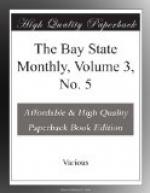Among the first colonists of the New City were an army of laborers who came to dig and wall the canals. These settled in shanties and cabins near the river-bank. When the great factories were built, a corps of operatives came to work in the mills. As in Lowell, Manchester and other manufacturing towns, many of the factory-girls came from New England homes, and were distinguished for their independence and thrift. A little later, ship-loads of expert weavers were brought from England and Scotland to work in the cotton-mills. A ship called the “North America” brought a load of 130 young Scotch people who shipped from Broomielaw Quay, in April, 1854. They were induced to come by the superior inducements offered here, and some of the best weavers ever employed in the mills came from Scotland. Later there was a large immigration from the Canadas, and from Ireland.
The entire population by the census of 1850 was 3,715. March 14th of that year the town was incorporated, bearing the name of Holyoke, Governor Briggs approving the bill.
The name selected was historical, from Mt. Holyoke, christened some two hundred years before, but its origin was from Elizur Holyoke, one of the early residents of this section.
The town of Holyoke was formerly a portion of Springfield of which Elizur Holyoke was among the early settlers, coming from England when a youth; and his name is identified with its early records. In 1640 he married Mary Pynchon. the tradition of whose grace and loveliness comes down with the musty records of the past, and lingers like a bright, sweet touch of romance among the historical pages of the grim colonial days.
[Illustration: SECTION OF THE DAM.]
A notable man of his time was Elizur Holyoke, and he was of a committee chosen to explore and ascertain the precise extent of Springfield, which then extended to Northampton and Hadley. A pretty legend of the valley is Dr. J.C. Holland’s story, told in most musical verse of the Mountain Christening.
“On a beautiful morning in June,
they say,
Two hundred and twenty years ago.”
Captain Holyoke and Captain Thomas with a little company of stanch followers started out on a survey of the country.
“Holyoke, the gentle and daring,
stood
On the Eastern bank, with
his trusty four,
And Rowland Thomas, the gallant and good,
Headed the band on the other
shore.
The women ran weeping to bid them good-bye,
And sweet Mary Pynchon was
there (I guess)
With a sigh in her throat, and a tear
in her eye
As Holyoke marched into the
wilderness.”
The melodious rhyme goes on to describe the journey up the valley and the night camp, where:
“The great falls roared in their
ears all night,
And the sturgeon splashed,
and the wild-cat screamed,
And they did not wake till the morning
light
Red through the willowy branches
streamed.”




